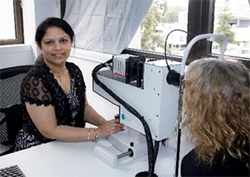Our research
Our research

Longitudinal studies
The pathogenesis of Alzheimer’s disease starts developing 20 years before any symptoms appear. Longitudinal studies allow us to follow populations at higher risk of developing the disease and determine biomarkers and behavioural signs of the development of the pathogenesis early on. This allows enough time for preventive strategies to be adopted.
The Australian Dementia Network (ADNet): Bringing together Australia’s dementia stakeholders
The ADNet team aims to create a well characterised database with people interested in participating in clinical trials studying Alzheimer’s disease (identification, prevention, treatment).
The slow build-up of two toxic proteins in the brain (amyloid-βeta and tau), are believed to be one of the causes of Alzheimer’s disease. Previous studies have demonstrated that amyloid-βeta starts depositing in the brain before any symptom is presented.
It is believed that the accumulation of amyloid-βeta may also speed up the formation of tau protein. Thus, in addition to creating a well characterised database of people interested in contributing to Alzheimer’s disease research, we intend to assess tau deposition in the brain and compare it with amyloid-βeta deposition.
Clinical interventions
When Alzheimer’s disease is diagnosed the brain has already suffered considerable degeneration and there is currently no cure for the disease. Thus, prevention seems to be the most effective strategy for AD. Current evidence suggests that lifestyle factors could provide a cost-effective and relatively simple means of protecting the brain against age-related cognitive decline and dementia. Our team is involved in some very exiting preventive strategy clinical interventions.
The Australian-multidomain Approach to Reduce dementia Risk by prOtecting brain health With lifestyle intervention (AU-ARROW)
The AU-ARROW investigates the effect of life-style factors on the maintenance of brain health and prevention of cognitive loss.
Memory loss is common among the general adult population. It may be nothing of clinical significance, a symptom of another condition, such as depression, or an early sign of dementia.
The most common form of dementia is Alzheimer’s Disease (AD). Unfortunately, there is no cure for this type of dementia. Currently available medications only treat the symptoms of dementia but do not halt the progression of the disease. However, researchers worldwide are working towards the development of strategies to stop the progressive decline of individuals with dementia.
Previous research indicates that lifestyle factors may aid in the prevention and management of AD. Lifestyle factors proven to be beneficial in AD include staying mentally active, practicing regular exercise and having a balanced diet. The European Finnish Geriatric Intervention (FINGER) study indicated that a multidomain lifestyle intervention could provide a cost-effective and accessible means of protecting the brain against age-related cognitive decline and dementia in ageing adults who are at an increased risk of cognitive decline. The study also reported improved physical function and self-perceived health, which have been associated with frailty.
There is an urgent need to expand this work to test the generalisability, adaptability and sustainability of its findings in diverse and global populations as a large-scale, single clinical trial to identify meaningful outcomes. The FINGER study resulted in the formation of a worldwide initiative known as the World-Wide FINGERS.
In this research study we aim to investigate whether various lifestyle factors combined may impact upon brain functioning, specifically memory. This study will be aligned with the activities proposed by the World-Wide FINGERS. Activities include physical exercise, computerised brain training, dietary counselling and medical monitoring of vascular risk factors for two years. We hoped that the outcome of this study will generate future preventive strategies against AD.
Coconut oil in Alzheimer’s Disease prevention (COAD-P)
Our COAD-P team investigates medium-chain fatty acids and their implication in Alzheimer’s disease prevention.
Alzheimer’s Disease (AD) is a debilitating disease that causes cognitive decline, and is the most common type of dementia in the aged population [1]. Current treatments for AD treat various symptoms but are not capable of stopping or preventing the disease. Therefore, research into primary prevention is crucial.

It is well established that in older adults who later develop AD, the brain becomes less efficient in glucose uptake and metabolism, therefore creating an energy deficiency in the brain [2], further leading to a loss of cognitive function [3]. The only significant back-up for the brain’s energy source are ketones [2]. Therefore, a constant supply of ketones might provide an adequate alternative energy supply to the ageing brain, preventing or slowing the loss of brain function.
Specifically, medium-chain triglycerides (MCT) are quickly digested into medium-chain fatty acids (MCFA), which in turn are absorbed and transported to the liver where they are metabolized into energy in the form of ketones [4]. The unique MCFA composition of coconut oil offers an alternative energy source that could be useful in the prevention or treatment of people with AD. The modification of lifestyle through the consumption of MCT oil may present a cost-effective and relatively simple means of protecting the ageing brain from cognitive decline and later AD.
Therefore, this research project focuses on exploring if MCT oils can provide enough energy to the brain efficiently, preventing or delaying the symptoms of AD. This project will be completed in two separate phases. The first phase will be a dose-dependent tolerance trial, and the second phase will be a double-blind randomized-controlled trial. During each phase, volunteers will consume a dosage of oil, and consent to various cognitive and blood tests at Macquarie University Hospital Clinics.

1. Martins, R., et al., Alzheimer's Disease: A journey from amyloid peptides and oxidative stress, to biomarker technologies and disease prevention strategies-gains from AIBL and DIAN cohort studies. 2018.
2. Cunnane, S.C., et al., Can ketones compensate for deteriorating brain glucose uptake during aging? Implications for the risk and treatment of Alzheimer's disease. Annals of the New York Academy of Sciences, 2016. 1367(1): p. 12-20.
3. Mamelak, M., Sporadic Alzheimer's disease: the starving brain. Journal of Alzheimer's Disease, 2012. 31(3): p. 459-474.
4. Schönfeld, P. and L. Wojtczak, Short-and medium-chain fatty acids in energy metabolism: the cellular perspective. Journal of lipid research, 2016. 57(6): p. 943-954.
ToTAL Study (Testosterone-Omega Three (DHA) - Amyloid Lowering)
Testosterone and fish oil may protect the brain from the accumulation of amyloid-βeta, a hall mark of Alzheimer’s disease (AD), and our team is studying if their combination can be used in the prevention of AD.
In 2018, the Australian Alzheimer’s Research Foundation together with researchers from Edith Cowan University (Perth, WA) and Macquarie University (Sydney, NSW) commenced the largest clinical trial to date to investigate the influence of testosterone on key markers of Alzheimer’s disease including amyloid-βeta, a protein mainly accumulating in the brains of individuals with the disease. There is currently no cure for Alzheimer’s disease.
Age-related decrease in testosterone levels in men has been linked to an increased risk of Alzheimer’s disease. Previous work by Professor Ralph Martins and his team has found that the effects of testosterone therapy may extend to both the accumulation and clearance of amyloid-βeta from the brain and may potentially prevent the disease.
The project will also study the effects of omega-3 fatty acids found in fish oil called DHA (Docosahexaenoic Acid). DHA is thought to protect brain cells from the damage caused by the accumulation of amyloid-βeta. It is hoped that combining fish oil with testosterone will have a stronger preventative effect.
Biomarkers

Alzheimer’s disease (AD) is the most common form of dementia and yet there is no effective treatment and a post-mortem examination serves as the only definitive diagnosis. Our group is interested to finding blood biomarkers that will allow for early diagnosis of Alzheimer’s disease and/ or detection of risk of the disease before the development of the disease. Early detection will contribute to the adoption of prevention strategies to prevent or delay the onset of the disease.
Identification of new ophthalmic biomarkers and their association to brain amyloid burden in preclinical Alzheimer's disease
There is still no definitive pre-mortem diagnosis for Alzheimer’s disease (AD) and the current gold standard markers are either invasive or expensive for population wide screening.

The project aims to investigate changes occurring in the retina in the eyes of study participants using a breakthrough NASA inspired technology and its relationship with changes occurring in the brain. Hyperspectral retinal imaging will be used in the project. This will enable us to identify potential biomarkers in the eye for the early diagnosis of AD in a highly-characterized cohort, wherein approximately 30% of study participants are in the preclinical stage of AD, as assessed from the brain beta amyloid load, a gold standard marker of AD.
Investigating blood biochemical alterations in pre-clinical and clinical Alzheimer’s disease
This project aims to track alterations in blood biochemical profiles of individuals who are at-risk of developing the disease and who have developed the disease and compare them against the blood biochemical profiles of healthy people at no apparent risk to Alzheimer's disease, to identify biochemical changes and therefore biological pathways associated with AD pathogenesis. These findings could contribute towards the development of a diagnostic and prognostic blood test, as well as the identification of potential drug targets for the disease.
Blood biomarkers for the diagnosis of pre-clinical Alzheimer’s disease employing the Dominantly Inherited Alzheimer Network cohort
This project aims to investigate alterations in biochemical profiles of individuals who will develop Alzheimer’s disease due to an inherited mutation, against family members who are non-carriers of the mutation, to identify Alzheimer's disease related blood changes which can contribute towards the development of a diagnostic blood test for the disease.
